this is the mini version of my blog 'an uncommon spiritual path' - you'll find the maxi blog here www.dionforster.com
Don't wanna be here? Send us removal request.
Text

Dietrich Bonhoeffer was born on this day (4 February 1906). What will we do today, that can secure peace, justice, and flourishing for coming generations? Here are a few ideas from Dietrich Bonhoeffer and Steve Biko https://www.researchgate.net/publication/381062211_Dietrich_Bonhoeffer_and_Steve_Biko_Toward_a_Politics_of_Hope_among_Born_Free_South_Africans
1 note
·
View note
Text
Oh child of Bethlehem, Prince of Peace, what do you wish for your birthplace, Bethlehem? What do you desire for your descendents in Palestine?
youtube
1 note
·
View note
Text

‘The high watermark of faith in the Abrahamic religions involves the praxis of love, peace, and justice measured in relation to the widow, the orphan, and the poor, rather than in rational understanding. Contemporary religious institutions frequently reduce this ethic to charity and almsgiving rather than a serious commitment to social change. The prevailing ideas in any institution are, as a rule, those of the elite and benefactors of that institution, who keep a wary eye on those who deviate from the principles embedded in a Constantinian-type synthesis of religion and state. This has resulted in theological support for tribal and nationalistic beliefs that are more prevalent and emotionally persuasive in religion than many devout believers care to admit.’
- Charles Villa-Vicencio, ‘Living between science and belief’ (2021: 46).
0 notes
Text
How might Christians respond with ‘militant non-violence’ (instead of aggression, or passivity) to violence and injustice? This article may offer something to reflect upon: https://doi.org/10.13140/RG.2.2.16196.23684
0 notes
Text
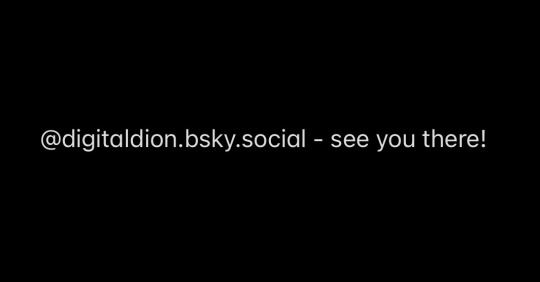
@digitaldion.bsky.social - see you there!
0 notes
Text
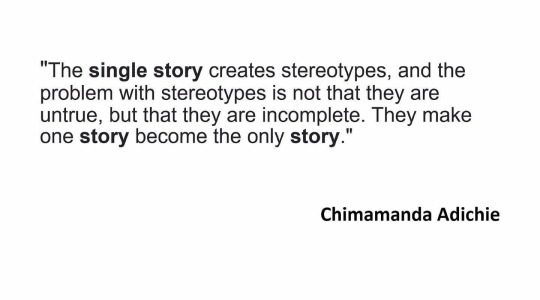
“The single story creates stereotypes, and the problem is not that they are untrue, but that they are incomplete. They make one story become the only story.”
- Chimamanda Adichie
1 note
·
View note
Text

‘We aren’t really free until we’re free from ourselves: our ego, our reputation, our self-image, our need to be right, our need to be successful, our need to have everything under control, even our need to be loved by others—or to think of ourselves as loving. The word “human” comes from the Latin humus, which means earth. Being human means acknowledging that we’re made from the earth and will return to the earth. For a few years we dance around on the stage of life and have the chance to reflect a little bit of God’s glory. We are earth that has come to consciousness. If we discover this power in ourselves and know that we are God’s creatures, that we come from God and return to God, that’s enough. As a human, I’m just a tiny moment of consciousness, a small part of creation, a particle that reflects only a fragment of God’s glory. And yet that’s enough.’
- Richard Rohr
2 notes
·
View notes
Text
instagram
0 notes
Text
A blessed Reformation Day! I give thanks for the Church in all of its various forms throughout history and the world. I am grateful for this community of imperfect people that nurtures faith, offers care, and seeks to be faithful. May we be more like Jesus, the one for others, and in being so, find our true selves.
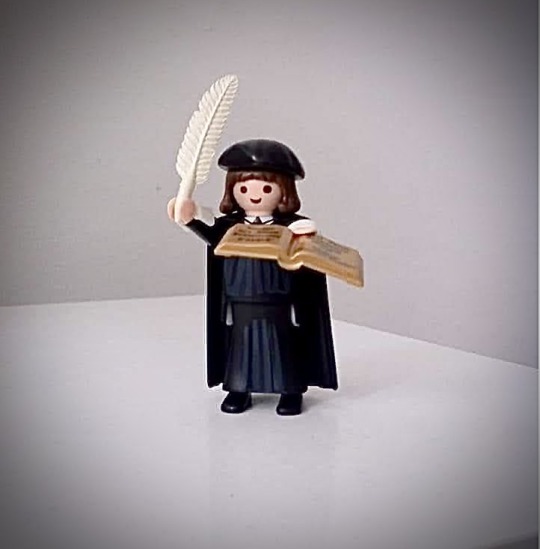
4 notes
·
View notes
Text

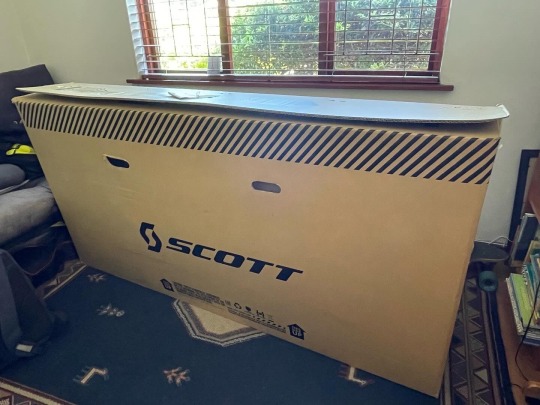
Liam and I disassembled and packed up my Giant Quick-E ebike. I hope it all works out smoothly! I found a company that will ship it with the battery (left with only 30% charge, and mounted in the bike). And a fellow South African who is living near where I will be in the Netherlands has kindly agreed for me to ship it to his home! That may mean that I will have Igor the ebike with me in the Netherlands! I am very grateful! I hope that it will all work out!
4 notes
·
View notes
Text

#GoBokke #Sprinboks #SouthAfrica 🇿🇦
4 notes
·
View notes
Text

‘...even in a deeply divided world, even in the most deeply divided relationship, the way things are is not the way things have to be.... What we need is not simply better gear and techniques but a story that helps us remember another world is possible. The good news is that God’s story offers us just that. In the midst of our world’s deep brokenness, God’s kingdom breaks in to create new possibilities.’
- Emmanuel M. Katongole, Reconciling All Things: A Christian Vision for Justice, Peace and Healing
3 notes
·
View notes
Text
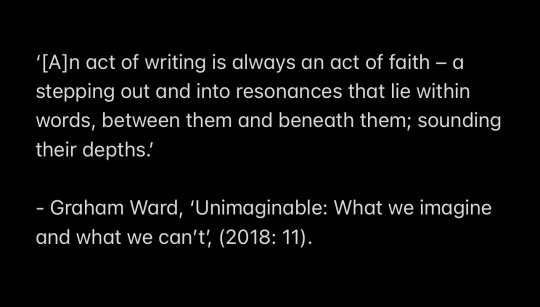
‘[A]n act of writing is always an act of faith – a stepping out and into resonances that lie within words, between them and beneath them; sounding their depths.’
- Graham Ward, ‘Unimaginable: What we imagine and what we can’t’, (2018: 11).
0 notes
Text
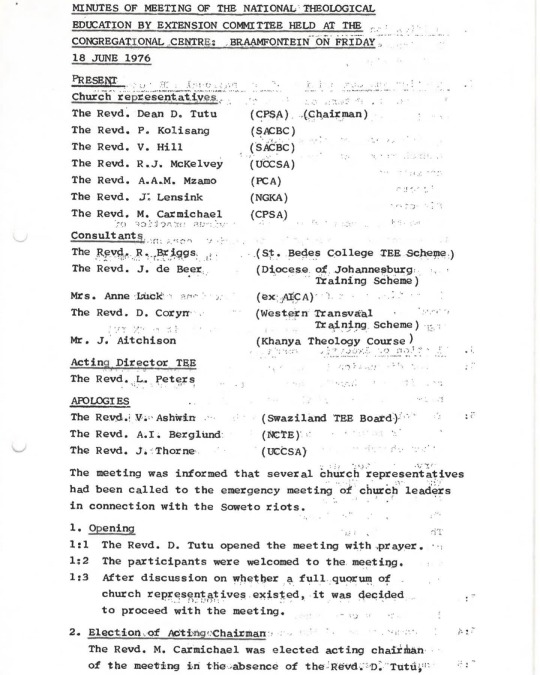
Here is a bit of painful, and hopeful, history on Youth Day.
This is an extract from the minutes of the first TEE College meeting that took place on 18 June 1976.
Desmond Tutu was elected as the first Chair of the board of the college. As you will see in these minutes, after opening the meeting, he was called away to Soweto, to support the community after the horrific police brutality in what is now known as the ‘Soweto Youth Uprising’.
TEE College was set up by the Eccumenical Churches to train women and men for ministry during a period when South Africa’s apartheid government would not allow black women and men to study theology at Universities.
In the years since 1976 TEE College has trained tens of thousands of persons for ministry and service via ‘extended’ learning (allowing persons to study while being employed, thus not taking scarce skills and limited resources away from the communities in which they were serving).
TEE College offers a Bachelor of Theology Degree, a Diploma in Theology, and numerous Higher Certificates in Theology and Ministry. We currently have over 3000 registered students.
I am very grateful to serve as the current Chair of the Board of TEE College.
TEEC offers a wonderful service to the Churches and society, with a gifted and dedicated staff based at our Campus in Brackenhurst. See the Facebook page for more details: https://www.facebook.com/TEECollege
1 note
·
View note
Text
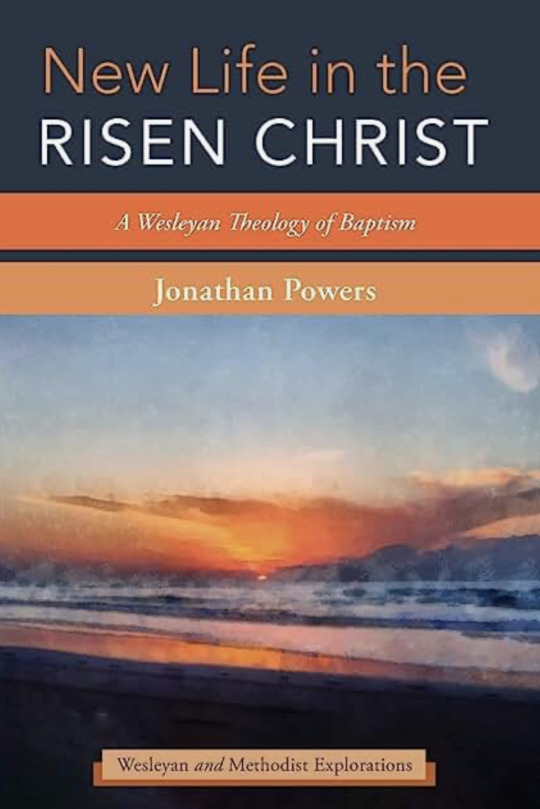
Google Scholar alerted me that a chapter I wrote on Baptism and Ecclesiology in contemporary Wesleyan and Methodist theology was published.
See it here: https://amzn.to/3P4Z2CZ
Here is some of the abstract:
Who are you? Or, stated slightly differently, to whom do you belong? These are crucial questions in contemporary society, and also in contemporary Christianity. Questions of identity and belonging dominate so much of our lives. Racial identity, national identity, gender identity, religious identity, and a host of other identifiers are coming under scrutiny—some would even say under attack—in today’s society. One’s appearance, language, nationality, political views, and sexual preference can all be used as means of inclusion or exclusion. This is not only a challenge in society at large, where issues related to migration, political identity, and religious identity feature as central concerns in social and political interaction. Questions of identity have also become central issues of reflection and contention within the Christian faith and the church. One of the most topical examples of this struggle for identity and belonging in the church is the debate over the ordination of gay and lesbian clergy in The United Methodist Church (UMC). Who is welcome in the church, and what are the theological criteria for belonging? If individuals or groups feel their identity and humanity is not recognized or celebrated within the church, how does this impact upon our students ecclesiology?
1 note
·
View note
Text
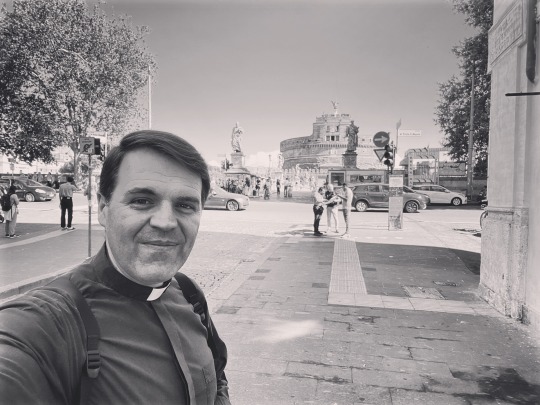
When in Rome… I am at the Vatican this morning, and then in a conference at the Anglican Centre in Rome. If a clerical collar is required, then so be it! Fr. Dion it is 🙏🙌
0 notes
